BBER TIMELINE
Early 1960s
Cecil H. Meyers, UMD professor of economics at the University of Minnesota Duluth, and Glen O. Gronseth, a research analyst for the Duluth office of the Minnesota Employment Security Division, began producing a powerful and popular research report – the Duluth Business Index (DBI).
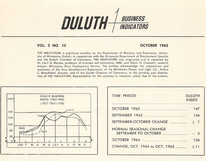
The BBER's DBI, 1965
The DBI, first published in 1964, provided an overview of the Duluth economy from the measurement and analysis of fifteen components that included coal, postal receipts, grain, and telephones.
These extensive monthly reports became sought-after tools for businesses and government and were later joined by the monthly publishing of the Duluth Retail Sales Index and the Duluth Hotel-Motel Tax Index.
1970s
Recognizing the need for a defined entity to oversee these extensive ongoing research projects, the BBER was officially established in 1970 through the appropriation of special monies in the amount of $10,000. Meyers was the first appointed director (1970–1979), and he also continued with full-time teaching responsibilities.
In October 1974, the Board of Regents approved UMD’s academic reorganization and named the School of Business and Economics with the BBER and its DBI fitting under that umbrella.
1980s and 1990s
Over time, the BBER gained the reputation as an unbiased and respected research entity and expanded its offerings to include cost-benefit analyses, input-output modeling, publications, forecasting, and more.
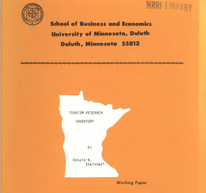
Tourism Research Inventory
Director Donald N. Steinnes, 1988
As requests for the BBER’s research and analysis capabilities continued to grow, its structure was changed to employ a full-time director, full-time editor/writer, and a small number of undergraduate research assistants.
The BBER's business indexes that started it all continued to be crucial data and information for the Duluth community, and they continued to be published until the late-1990s when it became increasingly difficult to gather the needed data.
BBER directors included Jerrold Peterson (1979–1983), Donald Steinness (1984–1990), Jerrold Peterson (interim 1990–1992) Kjell Knudsen (acting 1993–1995), and Richard Lichty (1996–2003).
2000s
In 2003, James Skurla began serving as director and had the longest role until his retirement in 2014. Current director Monica R. Haynes was hired in 2014 and has expanded the BBER's role to include more services that reach more clients, regionally, nationally, and internationally.
Alumni and Accolades
Many of the BBER’s former student researchers have gone on to have impressive careers, working at companies such as IBM, Boston Scientific, Google, Amazon, and Cirrus Aircraft. One former student, Chris McIntosh, is now a faculty member in UMD's economics department, and David McMillan is UMD's interim chancellor.
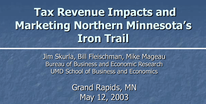
Tax Revenue Impact Study, 2003
Over the years, the BBER has taken on many large and notable research projects, most of which can be viewed on the U of M's Digital Conservancy.

Bob's career springboard began at age 15, working for his dad, Cecil Meyers, at the Bureau of Business and Economic Research.
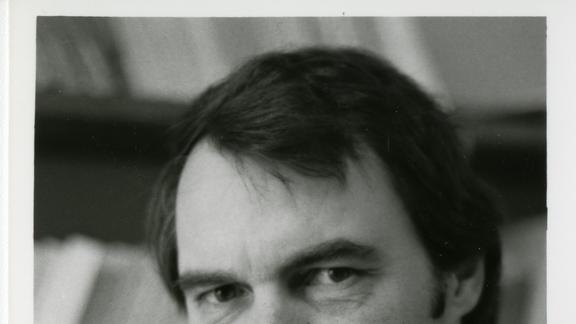
Jerry Peterson, former BBER director from 1979 to 1993
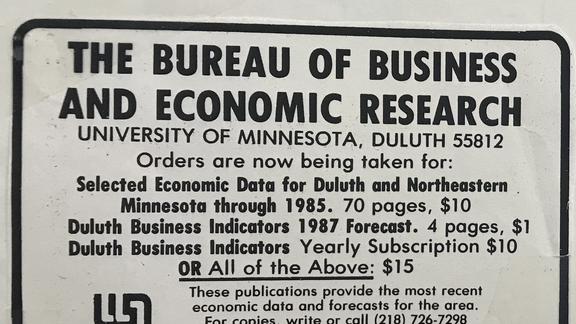
We opened the archives to highlight some newsworthy historical BBER projects from each decade.
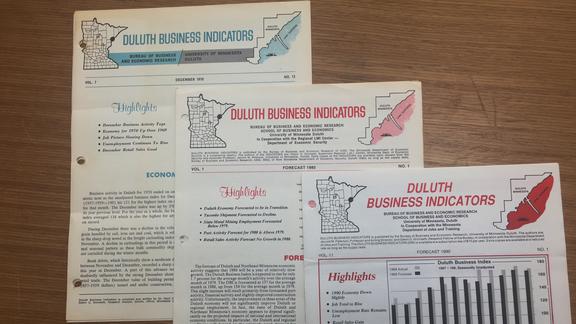
The Duluth Business Index (DBI), published from the mid-1960s to late 1990s, was what launched the Bureau of Business and Economic Research.